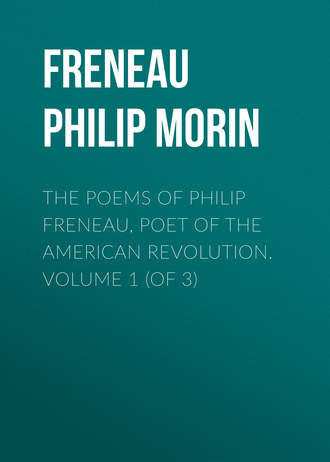 полная версия
полная версияThe Poems of Philip Freneau, Poet of the American Revolution. Volume 1 (of 3)
164
"In this dark day of peril to the cause and to himself (at the close of 1776) Washington remained firm and undaunted. In casting about for some stronghold where he might make a desperate stand for the liberties of his country, his thoughts reverted to the mountain regions of his early campaigns. General Mercer was at hand, who had shared his perils among those mountains, and his presence may have contributed to bring them to his mind. 'What think you.' said Washington, 'if we should retreat to the back parts of Pennsylvania, would the Pennsylvanians support us?' 'If the lower counties give up, the back counties will do the same,' was the discouraging reply. 'We must then retire to Augusta County, in Virginia,' said Washington. 'Numbers will repair to us for safety, and we will try a predatory war. If overpowered, we must cross the Alleghanies.' Such was the indomitable spirit, rising under difficulties and buoyant in the darkest moment, that kept our tempest-tossed cause from foundering." —Irving's Washington, II, 448.
165
"To herd with North, or Bute, or Mansfield there," —Ed. 1786.
166
Published in the Freeman's Journal, July 3, 1782, under the title "On a Lady's Singing Bird, a native of the Canary Islands, confined in a very small cage. Written in Bermuda, 1778."
167
This stanza and the next original in the edition of 1809.
168
This stanza and the two following original in the edition of 1809.
169
"Belinda." —Ed. 1786.
170
"Built up the River Merrimack at Salisbury, Massachusetts, she was first sailed in the spring of 1778, soon after her being launched, and was then commanded by Capt. Landais, a Frenchman, who was preferred to the command as a compliment to his nation and the alliance made with us, a new people."
"As Philadelphians we are entitled to some preeminence for our connection with this peculiar frigate. After the close of the War of Independence, she was owned in our city and employed as a merchant ship. When no longer seaworthy, she has been stretched upon the margin of Petty's Island to remain for a century to come, a spectacle to many river passengers." —Watson's Annals, III, 338.
The Alliance was the only one of our first navy, of the class of frigates, which escaped capture or destruction during the war. She was during the Revolution what "Old Ironsides" became in later years, the idol of the American people. She was in many engagements and was always victorious.
Freneau's poem first appeared, as far as I can find, in the 1786 edition. It was probably written shortly after the launch of the frigate.
171
This poem was first published as a pamphlet in 1781, by Francis Bailey of Philadelphia, in connection with "The Prison Ship."
Nicholas Biddle, born in Philadelphia in 1750, was a sailor from his boyhood. At one time he served beside Nelson in the British navy. In 1776, when the new frigate Randolph, of thirty-two guns, was launched at Philadelphia, he was made commander, and after several unimportant cruises he was placed over a small fleet of war vessels, with the Randolph as flagship. In March, 1779, he fell in with the British ship Yarmouth, and after a vigorous action of twenty minutes, the Randolph was blown up by her own magazine, only four men escaping with their lives.
Freneau has made several minor errors. The date 1776, which is found on all the versions of the poem, should manifestly be 1779. The Yarmouth did not attempt flight, nor did Biddle die at the moment of victory, as the poet represents. In the words of Cooper, "Victory was almost hopeless, even had all his vessels behaved equally well with his own ship." Captain Vincent had only five men killed and twelve wounded at the time of the explosion, yet the gallantry and skill of Biddle in the face of great odds justify all the praise that Freneau gives him.
172
"His ancient honours fled." —Ed. 1786. This stanza was omitted from the 1795 edition, but returned again in 1809.
173
"And lost what honour won." —Ed. 1786. "And lost what courage won." —Ed. 1795.
174
From the 1786 edition. In the 1795 edition the title was changed to "The Invitation."
Captain John Paul Jones sailed from Isle de Groaix, France, on his memorable cruise, August 14, 1779. To secure a crew for his fleet had been the work of many months.
175
"Disheartening sight." —Ed. 1795.
176
Unique in the October number of the United States Magazine, 1779. The poem doubtless describes the poet's voyage home from the West Indies, in June and July, 1778.

